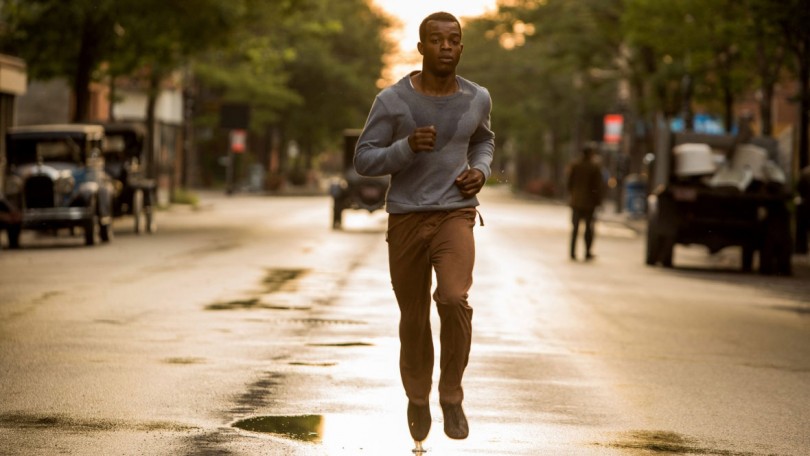Patrick Bruer
Race, directed by Stephen Hopkins, written by Joe Shrapnel, Anna Waterhouse, starring Stephan James, Jason Sudeikis, Jeremy Irons, William Hurt.
There’s no need for a spoiler alert for this sports biopic.
Track and field icon Jesse Owens won four gold medals—in the 100 meters, the 200 meters, the 4×100 meter relay, and the long jump—representing the United States in the 1936 Berlin Olympics. Race is a worthy retelling of the Owens’s story. It is a visually appealing, entertaining and inspirational movie, even if in the end the storytelling seems less than complete.
Race focuses on about three years of Jesse Owens’s life, from when he leaves Cleveland, OH, as a 20 year old track and field recruit for Ohio State University, until he triumphs in Berlin and returns to the United States. Many story lines weave their way across this short span of time.
Owens, convincingly played by Stephan James, encounters overt racism while at Ohio State. He has a rocky and complicated relationship with his college coach Larry Snyder (Jason Sudeikis), but it grows into a bond of mutual admiration and respect. His love for his hometown girlfriend, the mother of the first of what would be their three daughters, gets challenged by the temptations of fame. Owens’s emotionally veiled relationship with his own father is expressed more in silence than in word or action.
What drives the opening drama is the question of whether the United States would boycott the Berlin Games. Hitler became chancellor of Germany in 1933, and embarked on a program of massive industrialization and military buildup, initially trying to downplay the likelihood of war while attempting to garner international support for his regime. Yet, by 1935 the Nuremberg Laws had passed, making plain the ant-Semitic and racist core of Nazi state policy.
Dialogues between American Olympic Organization officers Avery Brundage (Jeremy Irons) and Jeremiah Mahoney (William Hurt) encapsulate this debate. Brundage, who had visited Germany to gauge the situation first hand, urged participation since “politics has no place in sport.” The scenes of Brundage inspecting construction of the Olympic Stadium depict the power and impending menace of the German machine. Mahoney, who insisted that even implicit support for the Hitler regime would be inconsistent with American ideals, resigns himself to the losing side of the argument.
Owens is cross pressured about his own role in the Games. He was already a famous American athlete, having set or tied for world records within 45 minutes at a college meet in 1935. He was a gold medal favorite whose participation would seem a foregone conclusion. Yet, the NAACP urged him to make a political statement about human rights and equality by sitting out the Games.
While in Berlin, Owens’s exploits provide material for film director and Nazi propagandist Leni Riefenstahl (played enigmatically by Carice van Houten) and Owens is befriended by his German rival Carl “Luz” Long (David Kross), the great yet deeply ambivalent Aryan hope.
Owens’s fourth gold medal, in the relay, itself becomes a product of capitulation to anti-Semitic sentiment. Yet perhaps the most infamous incident during the Games is the “snub” of the victorious Owens by German Chancellor Hitler, who absents himself from a congratulatory meeting with the gold medalist.
The circumstances of this “snub” and its meaning(s) get a closer examination in Jeremy Schaap’s book “Triumph: The Untold Story of Jesse Owens and Hitler’s Olympics.”
Despite all that this movie does so to layer the narrative, at times it feels like the story is getting told in cinematic shorthand, in a way that underplays its larger message about discrimination.
For instance, Owens appears in his first OSU practice possessed of world class speed. What brought to that point? Where was his talent identified and developed? Some treatment of that storyline would satisfy not only those interested in Owens’s athletics per se, but would cast a deserved and favorable light on the community that nurtured him, one in which other African Americans had agency and effect.
And while it is true that Owens helped to puncture the myth of absolute Aryan superiority at Hitler’s Olympics (though Germany took 89 medals that year to 56 for the second place United States, 33 gold to 24 for the Americans), he was not the only athlete to do so.
African American Cornelius Johnson, for instance, had already won a gold medal in the high jump before Owens began to compete. Owens was among 19 African Americans at the 1936 Games, including 200 meter silver medalist Mack Robinson, the older brother of baseball path breaker Jackie Robinson, and the first two black female U.S. Olympians in track and field. In the marathon, the iconic event of any Olympic summer games (pardon my bias), Japanese runners took gold and bronze.


